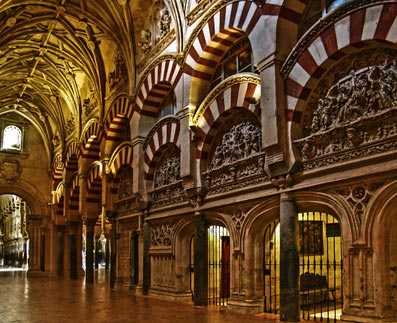 CÓRDOBA We received this by e-mail from someone we know, but it could have been floating around in the ether for a long time. We don't know how true it is, and, yes, it is a bit of propaganda. But it is still interesting. The beautiful Mosque in Córdoba was built between 780 and 785 AD by Abderraman I. Twelve centuries later, on March 2, 2006, the Catholic Church registered it in its name at Property Registry 4 in that city (Tome 2381, Book 155, Folio 198). It cost a mere €30. This 'robbery', says our source, was possible thanks to two 'miracles'.>>>The first of these was because the government of José María Aznar changed the laws on mortgage in 1998, thus allowing the Church to appropriate itself of buildings in the public domain, even if they are/were part of the country's heritage. All the local bishops had to do was sign an affidavit declaring that the building was owned by the Church for it to be registered in the official Property Register. No notary necessary.
CÓRDOBA We received this by e-mail from someone we know, but it could have been floating around in the ether for a long time. We don't know how true it is, and, yes, it is a bit of propaganda. But it is still interesting. The beautiful Mosque in Córdoba was built between 780 and 785 AD by Abderraman I. Twelve centuries later, on March 2, 2006, the Catholic Church registered it in its name at Property Registry 4 in that city (Tome 2381, Book 155, Folio 198). It cost a mere €30. This 'robbery', says our source, was possible thanks to two 'miracles'.>>>The first of these was because the government of José María Aznar changed the laws on mortgage in 1998, thus allowing the Church to appropriate itself of buildings in the public domain, even if they are/were part of the country's heritage. All the local bishops had to do was sign an affidavit declaring that the building was owned by the Church for it to be registered in the official Property Register. No notary necessary.
The second miracle was that, given the ownership, therefore, of a 23,400 square metre property in the middle of Córdoba, there is no tax -especially the Council Tax- to pay, because the Church doesn't pay taxes. And nor does it pay for maintenance costs.
Over €1 million a year in entrance fees
The entrance fee for the Mosque is €8 per person; that's well over a million per year. You don't get a receipt but it is not certain that the fee is not liable for taxes.
The Bishopric of Córdoba is the owner plenipotentiary of the Mosque; the ownership of the property is absolute. It can also decide who works there as a guide - and who can't. The mosque is often closed to other visitors because there are special visitors (usually members of the priesthood).
Yet the cost of restoration and upkeep is not met by the Church. It is met by the taxpayers.
The Church is thus registered as owning hundreds of buildings -often historic- under similar conditions, many of them financed by the local populace, directly or indirectly.
Successive governments never changed the law
The government of José Luis Zapatero never got around to changing the law in his eight years in office; his successor as Socialist leader, Alfredo Pérez Rubalcaba, promised to do so in his electoral manifesto, but didn't get elected. It is highly unlikely that the PP government that did get elected will put an end to this outrageous legal abuse. However, it is possible that the European Union will oblige the Church in Spain to pay taxes, as it did in Italy.
It is no insignificant amount of money we're talking about: the thing costs us around €3billion a year; roughly the same amount as the present Rajoy government intends to cut back this year from salaries ifor teachers, doctors and funcionarios.
As we said: we don't know how true all this is, and it does smack of propaganda by teachers, doctors or funcionarios. But the question is there: why should the Church not pay taxes?

No comments:
Post a Comment
Thank you for taking the time to comment. It will be published as soon as it is moderated and/or edited.